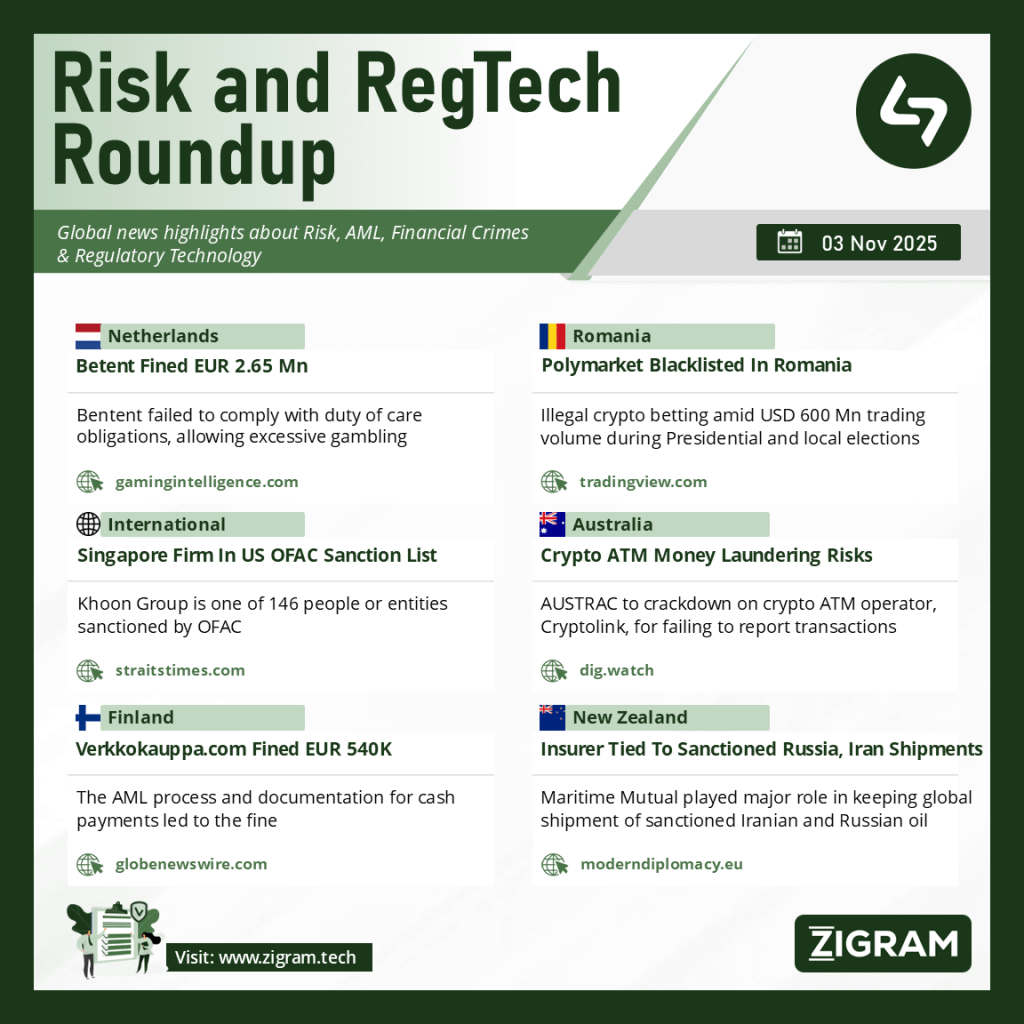Anti Money Laundering News (27 Oct – 02 Nov 2025)
Welcome to this week’s edition of the Global AML News Weekly Digest. Here are the top stories making headlines around the world:
Netherlands regulator fines BetEnt €2.65 million for duty-of-care failures
The Kansspelautoriteit (KSA), the Dutch gambling regulator, has imposed a fine of €2.65 million on BetEnt B.V. (operator of the BetCity brand) for failing to protect young adult players from excessive losses. The regulator found serious shortcomings in how BetEnt monitored high-risk behaviour, intervened (or failed to intervene) when losses mounted, and adhered to its duty of care obligations under Dutch law.
Why it matters: This decision underscores the increasing regulatory scrutiny in the Netherlands of online gambling operators’ duty-of-care practices, especially regarding vulnerable player groups such as younger adults. Operators active in the region should reassess their player-protection frameworks and ensure robust monitoring of high-loss accounts.
Romania blacklists Polymarket amid $600 million-plus crypto election wagers
The National Office for Gambling (ONJN) of Romania has added the blockchain-based prediction platform Polymarket to its blacklist of unlicensed gambling operators, classifying the platform’s activity as “counterpart betting”. The regulator cited trading volumes in excess of US$600 million tied to the recent presidential election, and asserted that regardless of technology (crypto or fiat), such activity is gambling and must be licensed.
Why it matters: This move signals heightened regulatory enforcement in the crypto/prediction-market space. Platforms offering event-based staking may face increased scrutiny in jurisdictions that treat them as gambling rather than trading. Firms operating in or targeting Romania (or similar jurisdictions) should evaluate license- and AML/FT-compliance exposure.
Singapore-linked firm sanctioned by US over cyber-crime probe
The US Department of the Treasury has sanctioned Khoon Group Limited, a Singapore-based company (formerly involved in electrical engineering works including for the Housing & Development Board (HDB)), over its links to a Southeast Asia-based cyber-crime network led by Chen Zhi. The firm is among 146 entities designated for alleged involvement in online scams and illicit financial flows. The company denies wrongdoing, but its shares have fallen significantly.
This action illustrates how non-financial companies can fall into the cross-hairs of sanctions and cyber-crime enforcement. For compliance and risk teams especially those dealing with supply-chain, M&A or third-party risks—the case serves as a reminder to maintain robust vendor/partner due diligence and monitor sanctions-related developments.
AUSTRAC cracks down on crypto ATM money-laundering risks in Australia
Australia’s financial crime regulator, AUSTRAC, has identified crypto ATMs as a major money-laundering vulnerability. The regulator fined one operator, Cryptolink PTY LTD, A$56,340 for failures reporting large cash transactions on time and directed it to enhance its AML/CTF controls. Investigations revealed that 85% of the 90 most frequent ATM users were linked to scam or money-mule activity.
Why it matters: For fintech, crypto and compliance teams, this reinforces the need for rigorous transaction monitoring and source-of-fund checks in alternative finance channels. Emerging business models should not assume regulatory leniency just because the channel is crypto-native.
Finnish e-commerce firm fined EUR 540,000 for AML MP compliance gaps
Verkkokauppa.com Oyj, a major Finnish online retailer, has been assessed an administrative fine of EUR 540,000 by the Regional State Administrative Agency for Southern Finland. The sanction stems from an inspection covering the period September 2020–August 2023, which found deficiencies in cash-payment risk assessment, customer due-diligence and reporting obligations under Finland’s AML Act. The company stated it has tightened procedures including a €200 cap on cash payments.
Why it matters: This case shows that AML/CTF obligations extend beyond pure financial institutions, into sectors like retail. Companies accepting cash payments or high-value transactions must ensure they have adequate risk-based controls, documentation and monitoring in place.
New Zealand insurer tied to sanctions-evading Russian/ Iranian oil shipments faces probe
A Reuters investigation reveals that Maritime Mutual Insurance Association (MMIA), a New Zealand-based insurer, provided cover to hundreds of tankers connected to sanctioned Russian and Iranian oil shipments. The firm, led by Paul Rankin and family, is being investigated by authorities in New Zealand, the US, UK and Australia for potential sanctions or AML breaches. The shadow fleet’s oil export operations allegedly flowed through reinsurance networks linked to major global insurers.
Why it matters: This highlights how sanction-evasion risks can permeate seemingly benign insurance and reinsurance markets. For those working in compliance, maritime finance, or insurance risk assessment, this is a cautionary example of exposure to complex international sanctions networks.
Stay informed with our weekly digest, bringing you the most impactful news from around the globe. Thank you for reading!
Subscribe to our weekly Newsletter – Click Here
Empower your organization with ZIGRAM’s integrated RegTech solutions – Book a Demo
- #AML
- #FinancialCrime
- #MoneyLaundering
- #Compliance
- #RegTech
- #Sanctions
- #FraudPrevention
- #GlobalRegulation
- #CryptoCrime
- #LegalUpdates
- #AUSTRAC
- #FATF
- #FinCrime
- #CryptoBetting

